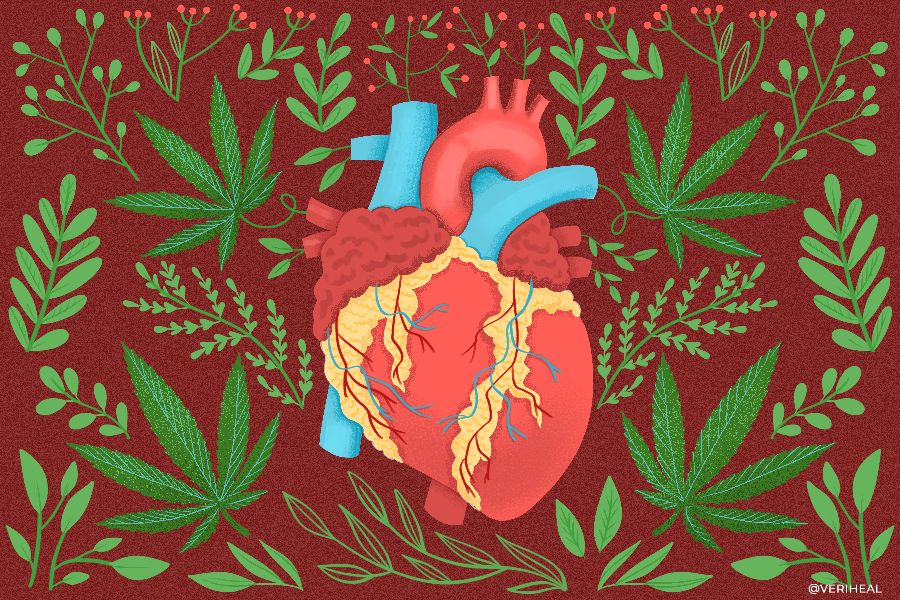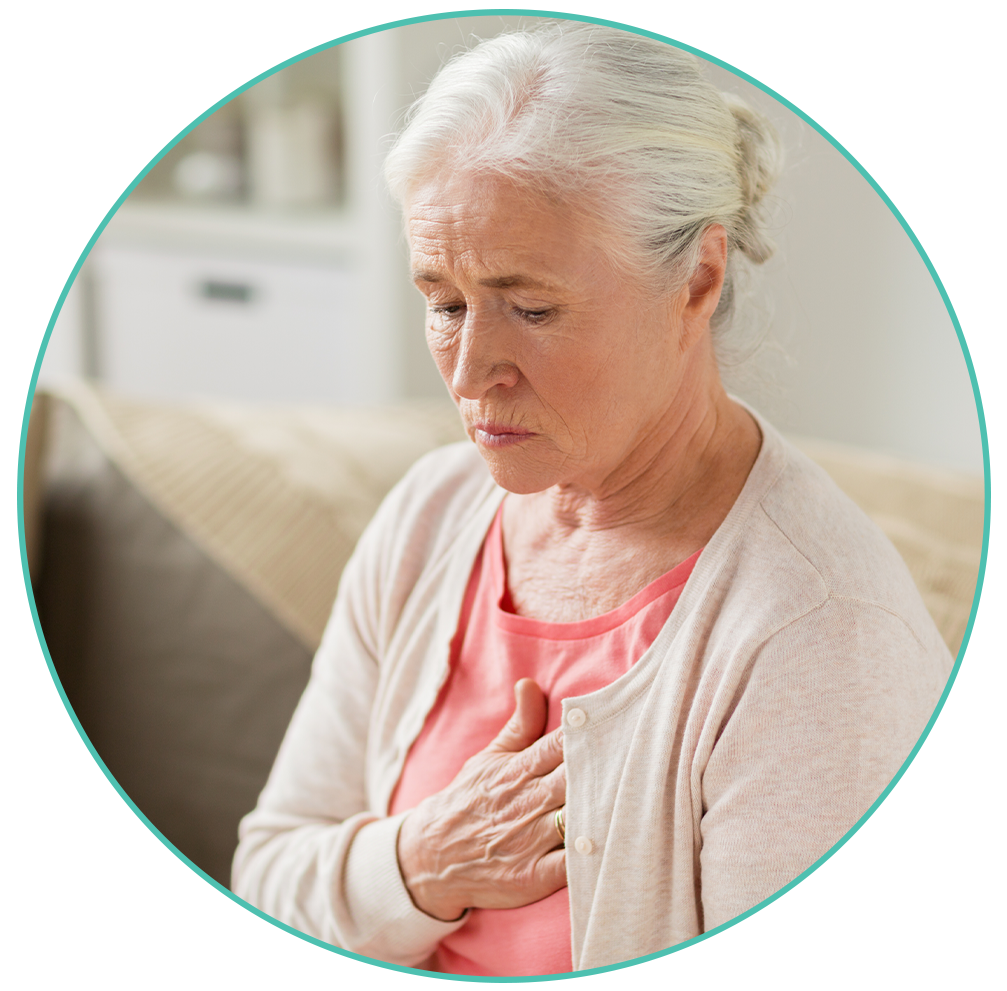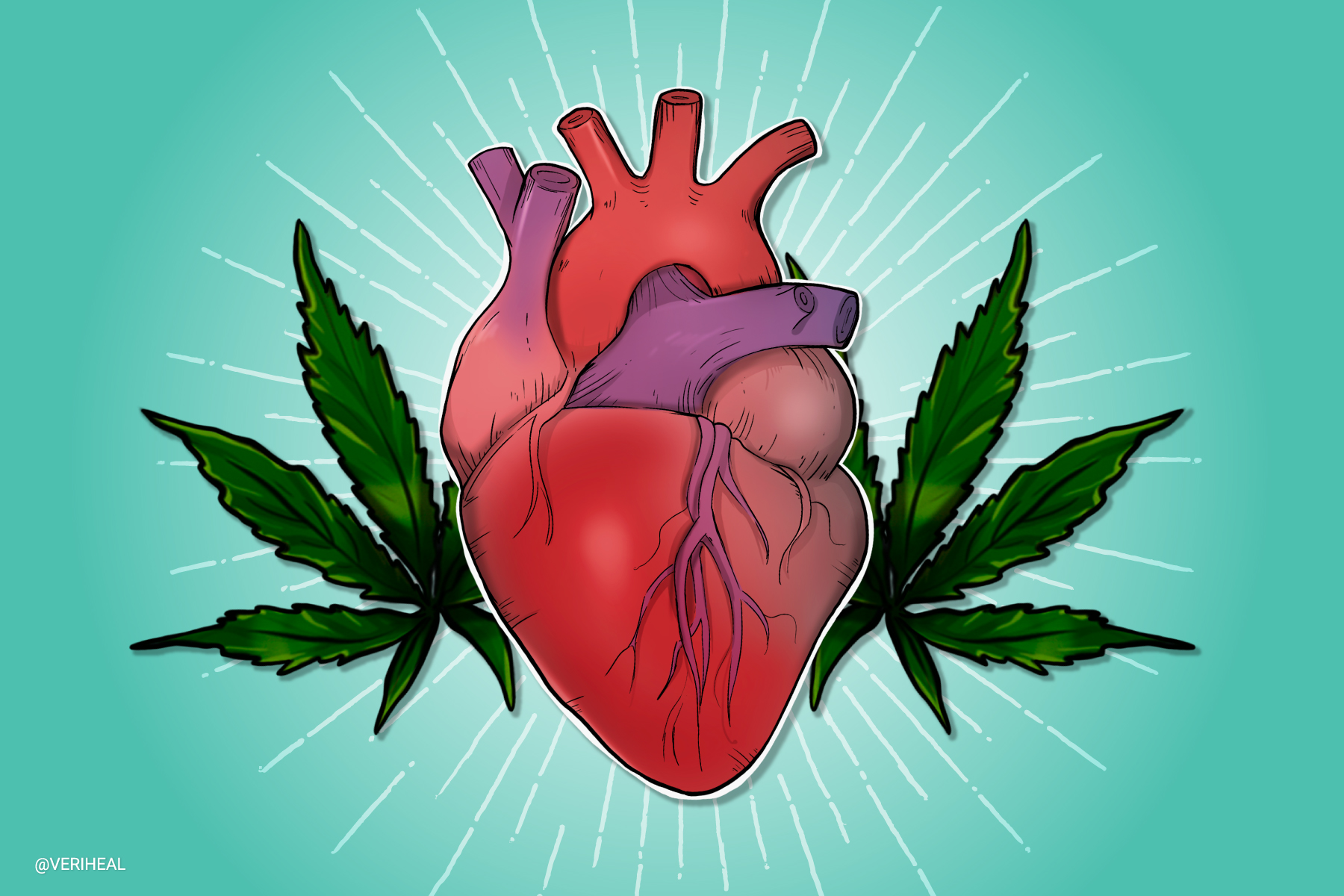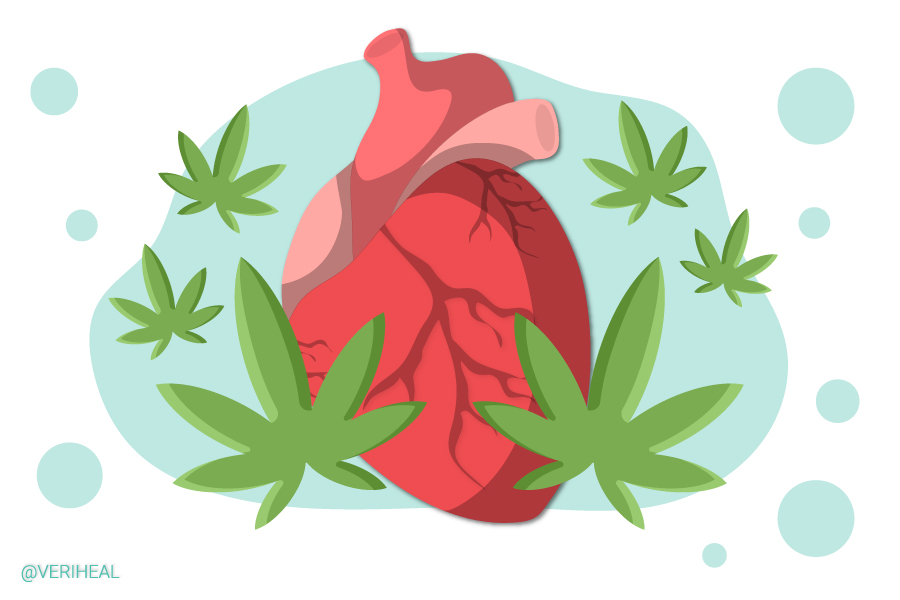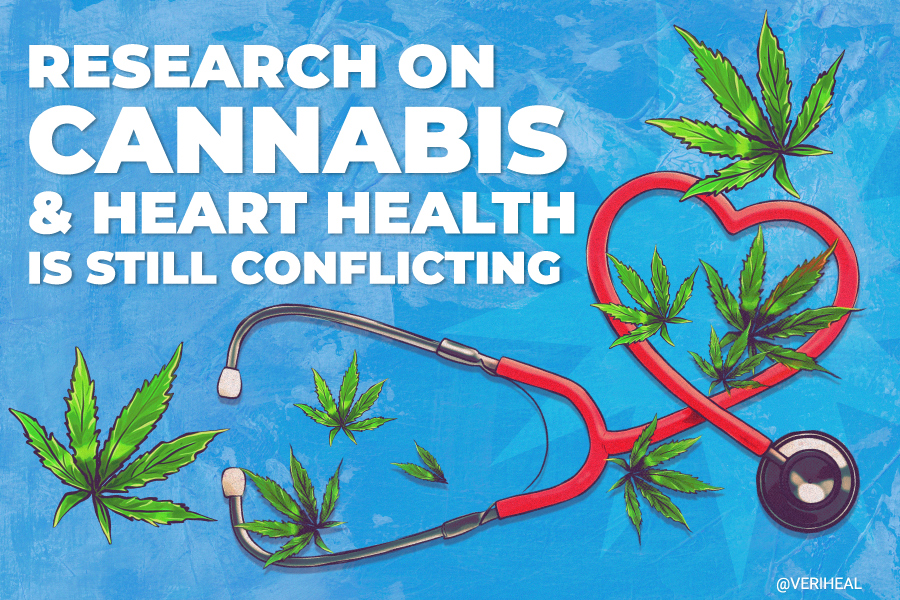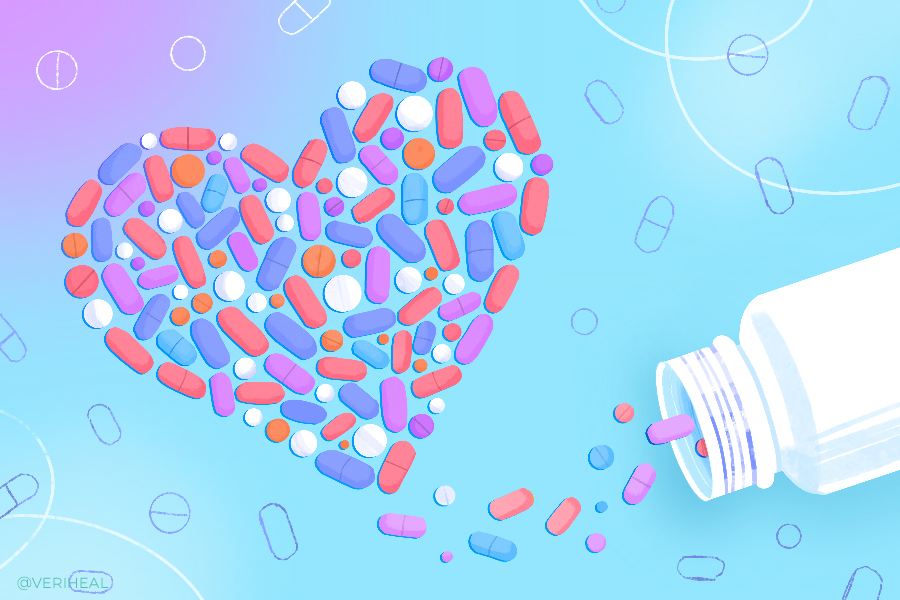Heart Disease
- What are the Signs, Symptoms and Types of Heart Disease
- Are Cannabinoids a Good Treatment Option for Heart Disease?
- How Does the Endocannabinoid System (ECS) Play a Role in Treating Heart Disease
- What Cannabis Preparations are Suitable for Heart Disease
- Talking to Your Doctor About Heart Disease Treatments
The heart is the body’s most vital organ since this intricately designed pump transfers blood across a 60,000-mile-long network of vessels (13). Taking care of your heart requires you to make thoughtful and healthy lifestyle choices. Unfortunately, the risk of heart disease is high for smokers and people with high blood pressure, high cholesterol, or diabetes.
One person loses their life every 34 seconds in the U.S. due to cardiovascular disease. Approximately 697,000 people in the United States lost their lives from heart disease in 2020 — equivalent to one in five deaths nationwide.
People with poor lifestyle habits face a higher risk of a heart attack. Lack of exercise, obesity and poor diet are other contributing factors to certain types of heart disease (14).
Not only is heart disease a primary cause of death for women and men across the U.S., but also for people of various ethnic and racial groups. Heart disease places a heavy financial burden on the economy at an annual cost of $229 billion yearly (2).
Based on a scientific statement published by the American Heart Association, cannabis products do not necessarily offer any clearly established benefits for heart disease. Still, they may support important underlying functions for heart health and healing. As a medicinal plant that harbors anti-inflammatory, antioxidant, anxiolytic, and cardioprotective properties, cannabis could be a viable form of complementary medicine (8).
What are the Signs, Symptoms and Types of Heart Disease?
Yearly physicals, follow-ups, and routine eye exams help catch chronic diseases in their early stages or manage them if they are already developed. Early detection and attention to the early symptoms of health issues or heart problems could help you avoid heart disease altogether.
On the other hand, if underlying chronic diseases and risk factors like smoking, high blood pressure, obesity, and diabetes are not prevented, diagnosed early, or managed appropriately, these problems will progress to heart disease. You should know how to spot the signs and contact your doctor as soon as possible. This is especially important if the symptoms become more regular or severe.
Typically, someone with heart disease will experience significant discomfort, aching, pain, burning, heaviness, pressure, and a squeezing sensation in the chest. Since many people mistake heartburn or indigestion for heart disease — a mistake that can be life-threatening — you should make it a priority to call or visit a doctor or emergency room or contact local emergency services.
There are a handful of different types of heart disease: aortic disease, coronary heart disease/coronary artery disease, stroke and TIAs, peripheral artery disease, congestive heart failure, heart attack, and angina. If you are experiencing any of the aforementioned symptoms in the arms, back, neck, shoulders, throat, or jaw, your body may signal that you have angina. Pay close attention to whether you feel these symptoms at rest or with exercise, and be able to describe them to your providers.
Doctors may also recommend treatment for the following:
- Blood vessel disease (such as peripheral artery disease)
- Dizziness or weakness
- Heart problems that are present since birth (congenital heart defects)
- Heart muscle disease
- Heart valve disease
- Irregular heartbeats (arrhythmias)
- Shortness of breath
- Palpitations
- Speedy heartbeat
Heart Disease: Causes and Complications
In cases of coronary heart disease (CHD), a patient will endure fatty deposit build-up (atheroma) on the artery walls surrounding the heart (coronary arteries). Doctors refer to this medical condition as atherosclerosis, the hardening of the blood vessels from atheroma buildup, which is the most common cause of coronary artery disease (15).
Plaque ruptures can also lead to blood clots, which may restrict blood flow through an artery or blood vessel and cause heart and brain complications. Some factors/lifestyle choices that amplify the risk of developing coronary artery disease include:
- Age (For males, the risk increases after age 55, whereas for females, the risk soars after menopause)
- Being diagnosed with diabetes or metabolic syndrome
- Family history of coronary heart disease
- Genetics
- High blood pressure
- Lack of physical activity
- Obesity
- Smoking
- Stress
Complications of heart disease include the following:
- Angina
- Aneurysm
- Heart failure
- Heart attack
- Peripheral artery disease
- Sudden cardiac arrest
- Stroke
Are Cannabinoids a Good Treatment Option for Heart Disease?
The appropriate treatment for heart disease will depend on the severity of artery-clogging, any heart damage or irregularities, and the root cause. The good news is that heart disease is generally reversible with lifestyle changes, medications, and potentially surgery.
Doctors usually prescribe cholesterol drugs and medications that minimize plaque buildup in the arteries, among other medications. Just as importantly, doctors will recommend prescriptions and lifestyle changes (e.g., diet, exercise, avoidance of smoking and alcohol) to treat the underlying chronic diseases like high blood pressure and diabetes that contribute to heart disease.
To minimize the risk factors associated with synergistic reactions, marijuana users should refrain from consuming the plant for medical or recreational use if they are currently consuming doctor-prescribed medication for heart problems unless they are advised to do so.
The standard treatment options for heart disease range from aspirin, beta-blockers, and calcium channel blockers, to angiotensin-converting enzyme (ACE) inhibitors and angiotensin II receptor blockers (ARBs), ranolazine, and nitroglycerin (11). Evidence suggests that cannabis, particularly delta-9 tetrahydrocannabinol (THC), may increase cardiovascular risk (20).
Scientific studies into cannabis and heart disease indicate that cannabis use may be linked to it or serve as a trigger for heart problems. Studies as recent as 2022 have linked cannabis use to increased risk of heart attack and stroke, particularly in younger populations (19,18, 6). Likely, this reflects the potential risk of THC-dominant strains or chemovars, and not CBD-dominant chemovars.
Cannabidiol or CBD is the most widely researched cannabinoid and has cardioprotective potential and advantages. It is known for its antioxidant and anti-inflammatory properties, which may be beneficial in heart disease or a post-heart attack state.
This 2020 review summarizes CBD’s complex biological effects: “CBD therapy can greatly limit the production of oxygen/nitrogen reactive species, thereby limiting cellular damage, protecting mitochondria, avoiding caspase activation, and regulating ionic homeostasis (5).” CBD may change the inflammatory response after a heart attack to limit tissue damage.
Certain terpenes and cannabinoids — the active compounds contained in the cannabis plant — like CBD possess anxiolytic effects. This means that they can help to tackle feelings of anxiety (12).
A research review published in the Brazilian Journal of Anesthesiology (English Edition) at the beginning of this year discovered that cannabis-based treatment significantly improved pain during movement, pain at rest and quality of sleep (16). Nausea is another unpleasant side effect of heart problems or comorbid conditions that could be reduced with cannabinoid consumption, with preclinical research suggesting that cannabinoids may assist with regulating nausea and vomiting (17).
Since anxiety may be associated with rapid heart rate (tachycardia), increased blood pressure, and decreased heart rate variability, cannabis users benefit from strains that contain the anxiolytic cannabinoid CBD.
There’s also proof of cannabis’ ability to act as a natural vasodilator — this study published in the Journal of Hypertension proved that CBD could prove effective as a potential antihypertensive drug — ergo, patients who struggle with heart disease-related high blood pressure may consider trying hemp-based medicine. Hemp is a type of cannabis that is CBD-rich, with trace amounts of THC (<0.3%) (1).
Moreover, some cannabinoids have analgesic properties, meaning that the plant is a natural painkiller with widespread pain-relieving health effects (3). When the coronary arteries become partially obstructed, it can cause chest pain (angina), thus resulting in chest pain and discomfort. That said, painkilling strains of medical marijuana could be worth a try. THC is a psychoactive compound renowned for producing the mind-altering effects of marijuana, so it should be consumed with caution among patients with cardiovascular health. THC can raise heart rate and lower blood pressure in the short term, which could cause cardiac instability in some people.
How Does the Endocannabinoid System (ECS) Play a Role in Treating Heart Disease?
The endocannabinoid system (ECS) is found in all living mammals. Cannabinoid receptors can be found on the surface of cells throughout the body. When plant-derived phytocannabinoids and body-produced endocannabinoids directly and indirectly, influence them, they trigger various therapeutic effects.
In a 2018 journal article, “The Endocannabinoid System and Heart Disease: The Role of Cannabinoid Receptor Type 2,” researchers acknowledge that “several studies support the role of CB2 signaling and the ECS in disease. Specifically, a large body of evidence exists to support a beneficial role for CB2 through the modulation of inflammatory mechanisms (4).”
A 2022 review goes on to confirm “a large body of evidence exists to support a beneficial role for CB2 through modulation of inflammatory mechanisms (4).” This means that the CB2 receptor likely plays a vital role in heart disease for its anti-inflammatory and anti-atherogenic effects. The researchers believe it may be possible to prevent or relieve some of the mortality and economic burden if we can better understand the signaling pathways involved with the ECS, CB2 receptors, and heart disease.
Numerous studies have revealed that endocannabinoids relax coronary and other arteries and reduce cardiac work (10). It’s not just cannabinoids that can communicate with the ECS to release therapeutic effects but also other cannabis-derived compounds like flavonoids and terpenoids.
What Cannabis Preparations Are Suitable for Heart Disease?
You will find many options when consulting with a doctor about marijuana use for heart disease. They include but are not limited to, edibles, pills, supplements, tablets, capsules, dissolvable cannabis powder, tinctures, oral sprays, and transdermal patches. Smoking or inhaling cannabis should be avoided in persons with cardiovascular disease.
Since THC raises heart rate and lowers blood pressure, it may also be best to avoid THC and opt instead for hemp-based, full-spectrum CBD, CBDA, CBG, CBGA, CBDV, THCV, and CBN with your provider’s approval first. Since hemp has less than 0.3% THC, you won’t feel intoxicated or have the same side effects. These are non-psychoactive cannabinoids available nationwide in hemp products and are not documented to have the same cardiovascular effects as THC.
Talking to Your Doctor About Heart Disease Treatments
If you believe that you might be experiencing the symptoms of heart disease or a heart attack, don’t hesitate to contact a doctor or 911. Emergency help is required since urgent treatment must be administered to prevent the heart from becoming more damaged.
Taking the time to attend routine health physicals and screenings will help limit your chances of experiencing heart disease. According to the American Heart Association (AHA), adults should attend the following heart health screenings even if they don’t have a medical history of heart disease:
- Blood pressure and cholesterol tests from the age of 20
- Blood glucose tests between the age of 40 to 45
- Body mass index (BMI) measurement (9)
The age at which you get a heart health screening will depend on your overall health and lifestyle choices. Earlier and more regular screening is necessary if you are obese, a smoker, or have high blood pressure, high blood cholesterol, or higher than normal blood sugar. People diagnosed with a heart condition like atrial fibrillation should also get more regular screening (7).
If your doctor believes that you might have heart disease, you may be required to undergo one or more tests to understand your heart’s electrical activity, such as heart rate and rhythm. Doctors must check the coronary arteries for plaque buildup with the following tests:
- Cardiac CT scan for calcium scoring
- Coronary CT angiography (CTA)
- Coronary catheter angiography
- Electrocardiography (ECG, EKG)
- Echocardiography
- Nuclear stress test
When a doctor diagnoses heart or vascular problems, such as heart disease, they will usually sit down and discuss cardiovascular disease (CVD) with you. CVD describes various conditions that negatively impact the heart and surrounding blood vessels.
Fatty deposit accumulation, often calcified and hardened, inside the arteries (atherosclerosis), is considered a form of CVD. It can cause blood clots and ischemic symptoms even before a heart attack occurs.
Once a diagnosis has been made, you can discuss treatment options with a cardiologist. However, cannabis should not be used as a substitute for alternative types of doctor-prescribed medication, treatments, or surgical procedures such as stent placements and carotid endarterectomies.
Complementary Treatments Worth Discussing with Your Doctor
The terms “complementary medicine,” “complementary and alternative medicine,” and “complementary therapies” relate to an array of healing resources designed to amplify the body’s natural healing capabilities.
Some types of complementary medicine favored in heart disease cases include body-based therapies, energy medicine, magnesium, and mind-body therapies. Cannabis, carnitine, coenzyme Q10 (CoQ10), taurine, herbs, hawthorn, berberine, and chelation therapy are also recommended complementary medicine. To help manage stress and heart rate, some patients will also practice yoga, mindfulness-based stress reduction, Reiki, tai chi, or acupuncture.
Remember that while medical marijuana and other complementary medicines can prove beneficial for you or a loved one with heart disease, you must continue doing any medication(s) or treatments that your doctor prescribes.
Note: The content on this page is for informational purposes only and is not intended to be professional medical advice. Do not attempt to self-diagnose or prescribe treatment based on the information provided. Always consult a physician before deciding on the treatment of a medical condition.
- Baranowska-Kuczko, M., Kozłowska, H., Kloza, M., Sadowska, O., Kozłowski, M., Kusaczuk, M., Kasacka, I., & Malinowska, B. (2020). Vasodilatory effects of cannabidiol in human pulmonary and rat small mesenteric arteries: Modification by hypertension and the potential pharmacological opportunities. Journal of Hypertension, 38(5), 896–911 https://journals.lww.com/jhypertension/Fulltext/2020/05000/Vasodilatory_effects_of_cannabidiol_in_human.16.aspx
- Centers for Disease Control and Prevention. (2022, October 14). Heart disease facts. Centers for Disease Control and Prevention. Retrieved November 1, 2022, from https://www.cdc.gov/heartdisease/facts.htm#:~:text=Heart%20Disease%20in%20the%20United%20States&text=One%20person%20dies%20every%2034,United%20States%20from%20cardiovascular%20disease.&text=About%20697%2C000%20people%20in%20the,1%20in%20every%205%20deaths.&text=Heart%20disease%20cost%20the%20United,year%20from%202017%20to%202018
- Elikkottil, J., Gupta, P., & Gupta, K. (2009). The analgesic potential of cannabinoids. Journal of opioid management, 5(6), 341–357. https://www.ncbi.nlm.nih.gov/pmc/articles/PMC3728280/
- Fulmer, M. L., & Thewke, D. P. (2018). The endocannabinoid system and heart disease: The role of cannabinoid receptor type 2. Cardiovascular & Hematological Disorders-Drug Targets, 18(1), 34–51. https://www.ncbi.nlm.nih.gov/pmc/articles/PMC6020134/
- Garza-Cervantes, J. A., Ramos-González, M., Lozano, O., Jerjes-Sánchez, C., & García-Rivas, G. (2020). Therapeutic applications of cannabinoids in cardiomyopathy and heart failure. Oxidative Medicine and Cellular Longevity, 2020, 1–17. https://www.ncbi.nlm.nih.gov/pmc/articles/PMC7641267/
- Goyal, H., Awad, H. H., & Ghali, J. K. (2017). Role of cannabis in Cardiovascular Disorders. Journal of Thoracic Disease, 9(7), 2079–2092. https://www.ncbi.nlm.nih.gov/pmc/articles/PMC5542986/
- Grey, H. (2020, May 14). Heart checkup: When to get one, test types, and more. Healthline. Retrieved November 1, 2022, from https://www.healthline.com/health/heart-health/scheduling-heart-health-checkup
- Heart disease – cannabis THC : CBD ratios. Cannakeys. (n.d.). Retrieved November 1, 2022, from https://cannakeys.com/thc-cbd-for-heart-disease/
- Heart-health screenings. www.heart.org. (2022, August 24). Retrieved November 1, 2022, from https://www.heart.org/en/health-topics/consumer-healthcare/what-is-cardiovascular-disease/heart-health-screenings
- Hiley, C. R. (2009). Endocannabinoids and the heart. Journal of Cardiovascular Pharmacology, 53(4), 267–276. https://www.ncbi.nlm.nih.gov/pmc/articles/PMC2728560/
- Mayo Foundation for Medical Education and Research. (2022, May 25). Coronary artery disease. Mayo Clinic. Retrieved November 1, 2022, from https://www.mayoclinic.org/diseases-conditions/coronary-artery-disease/diagnosis-treatment/drc-20350619
- McCann, U. (2021, October 15). Anxiety and heart disease. Anxiety and Heart Disease | Johns Hopkins Medicine. Retrieved November 1, 2022, from https://www.hopkinsmedicine.org/health/conditions-and-diseases/anxiety-and-heart-disease#:~:text=The%20Effect%20of%20Anxiety%20on%20the%20Heart&text=Rapid%20heart%20rate%20(tachycardia)%20%E2%80%93,heart%20muscle%2C%20and%20heart%20failure.
- National Geographic. (2021, May 3). The heart and how it functions. Science. Retrieved November 1, 2022, from https://www.nationalgeographic.com/science/article/heart-1
- NCI Dictionary of Cancer terms. National Cancer Institute. (n.d.). Retrieved November 1, 2022, from https://www.cancer.gov/publications/dictionaries/cancer-terms/def/heart-disease
- NHS. (n.d.). Coronary Heart Disease. NHS choices. Retrieved November 1, 2022, from https://www.nhs.uk/conditions/coronary-heart-disease/causes/
- Pantoja-Ruiz, C., Restrepo-Jimenez, P., Castañeda-Cardona, C., Ferreirós, A., & Rosselli, D. (2022). Cannabis and pain: A scoping review. Brazilian Journal of Anesthesiology (English Edition), 72(1), 142–151. https://www.sciencedirect.com/science/article/pii/S0104001421002748
- Parker, L. A., Rock, E. M., & Limebeer, C. L. (2011). Regulation of nausea and vomiting by cannabinoids. British Journal of Pharmacology, 163(7), 1411–1422. https://www.ncbi.nlm.nih.gov/pmc/articles/PMC3165951/
- Seif El Dahan, K., Machtoub, D., Massoud, G., Nasser, S. A., Hamam, B., Kobeissy, F., Zouein, F. A., & Eid, A. H. (2022). Cannabinoids and myocardial ischemia: Novel insights, updatedmechanisms, and implications for myocardial infarction. Current Medicinal Chemistry, 29(11), 1990–2010. https://pubmed.ncbi.nlm.nih.gov/34102966/
- Skipina, T. M., Patel, N., Upadhya, B., & Soliman, E. Z. (2022). Relation of cannabis use to elevated atherosclerotic cardiovascular disease risk score. The https://pubmed.ncbi.nlm.nih.gov/34930616/
- Subramaniam, V. N., Menezes, A. R., DeSchutter, A., & Lavie, C. J. (2019). The cardiovascular effects of marijuana: Are the potential adverse effects worth the high? Missouri medicine. Retrieved November 1, 2022, from https://www.ncbi.nlm.nih.gov/pmc/articles/PMC6461323/










